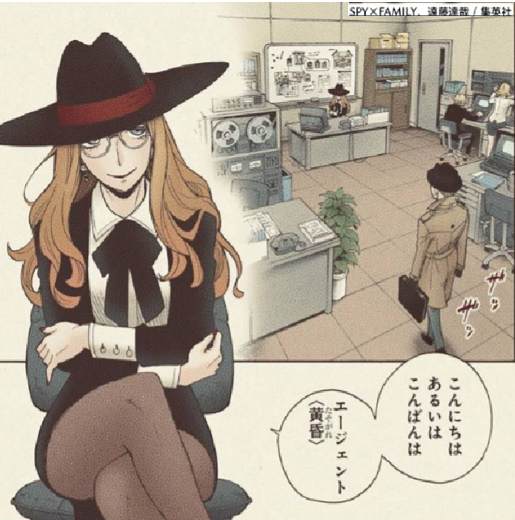Good day, or rather, good evening, everyone! Continuing from #6, this is the second half…
First, let’s learn Japanese greetings.
Greetings are very important communication in any country. Besides, greeting in the language of the person you are speaking to would be a sign that you are open and interested in the person and culture.
I will also introduce some useful expressions, “Survival Japanese” that you can use right away.
I will explain each greetings and expressions along with the scene where those are actually used in “SPYxFAMILY”, so please check them with fun.
This article #6 is a first half of “Greetings and Useful Expressions”.
At the end of this article, you will find a description of the structure and cautions (⇇Click here to jump) of this article. You can read on without reading that, but I think you’ll get the most out of the article if you do.
Are you ready? Let’s get started!!!
Gratitude
Casual:ありがとう
Polite:ありがとうございます
Honorific
Casual/Polite:(person’s name)さん
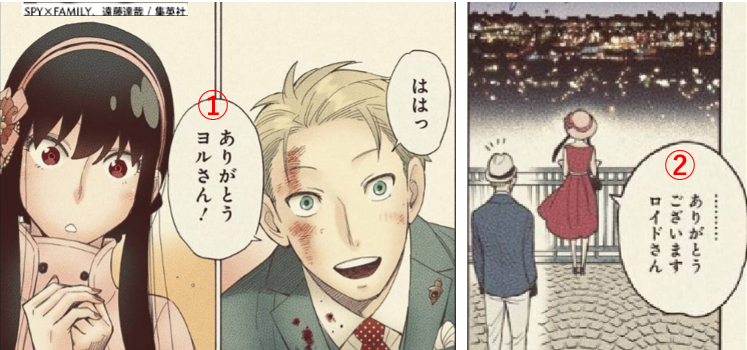
<Explanation>
①ロイド「ありがとう ヨルさん!」
Loid “Thank you Yor-san!”
②ヨル「…ありがとう ございます ロイドさん」
Yor “I appreciate it., Loid-san.”
These are words that expresses gratitude. Japanese people often accompany these words with「おじぎ」, a gesture of bowing their head lightly.
Normally, Loid speaks politely with Yor, but in this simple greetings such as ①「ありがとう」, he uses a friendly, casual, plain style. The subtle sense of distance is interesting.
②Yor speaks in a polite style of speech with a polite form word 「~ ございます」.
Both of them say the other person’s name after the word of gratitude, but this is unique to Manga, and Japanese people rarely say the other person’s name in natural conversation, but only when they want to get the other person’s attention.
In ① and ②, both Loid and Yor add 「さん」 to each other’s names. This is the most commonly used honorific in Japanese. It can be used regardless of gender or status. Used mainly by adults. You can express respect for the other person without being too polite or too casual.
Japanese adults rarely start calling each other by their first names when they first meet. People often refer to people by adding「さん」 to their last name, or by title or occupation. This point will be addressed in another article at a later date.
Please remember「さん」 this time.
Calling out ・ (relatively casual) apologies
Polite:すみません
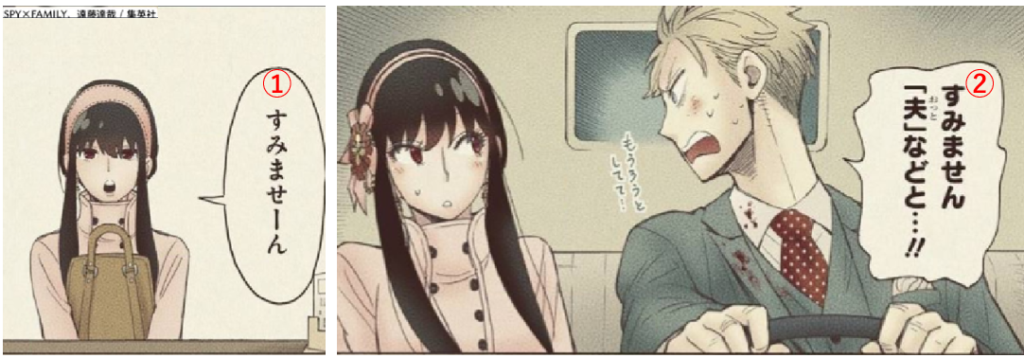
<Explanation>
①ヨル「すみませーん」
Yor “Excuse me!”
Loid “I’m sorry about husband thing…!! ”
①, Yor is in a tailor, and she uses「すみません」 to call out the staff in the back of the shop. This word is very often used when calling a store clerk, when asking someone for directions on the street, or when you want to get someone’s attention in various other situations.
Stretching out like「せーん」is the same as pronouncing English word for calling out “Hey” like “Heeeey” out loud in order to reach someone far away. It is natural to lengthen the vowel e of 「せ」, but 「すーみません」or「すみまーせん」 are unnatural.
On the other hand, in ②, Loid apologizes to Yor for referring to him as “Yor’s husband” in front of Yor’s colleagues, and here he uses「すみません」as “I’m sorry”,
This word originally comes from the expression “I’m sorry for causing trouble (to someone).” In English, ① is closer to “excuse me”, and ② is closer to “sorry”.
When addressing someone who is very close to them, Japanese people use the word 「ねえ」, which is a very casual word that does not mean apology.
For now, let’s learn the polite and often used「すみません」.
Greetings in the morning
Casual:おはよう / おはよー
Polite:おはようございます
Honorific
Plain:(person’s name)ちゃん
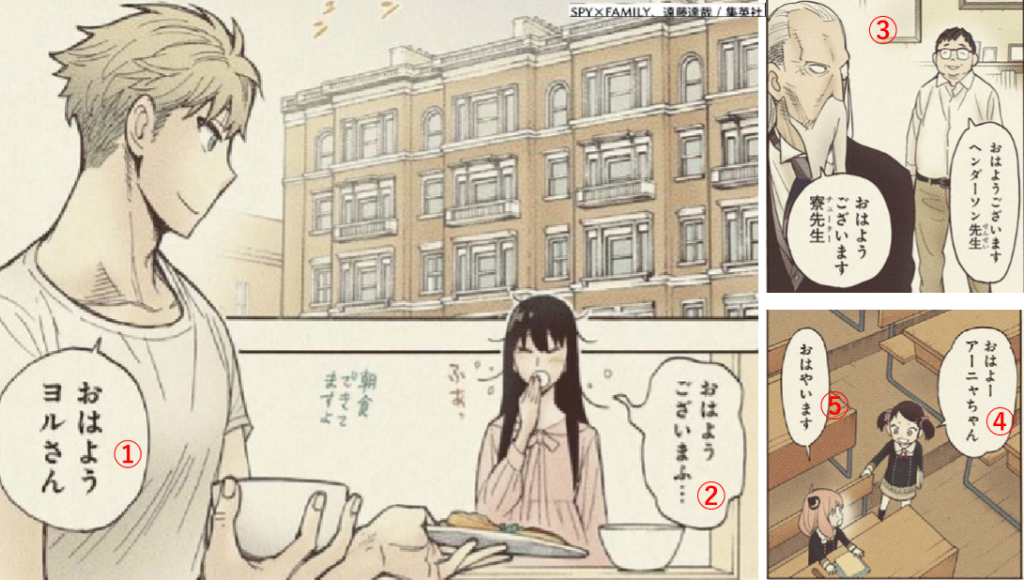
<Explanation>
①ロイド「おはよう ヨルさん」
Loid “Good morning, Yor-san”
②ヨル「おはよう ございまふ…」
Yor “Good morning…yawn”
③ 寮先生「おはよう ございます ヘンダーソン先生」④ヘンダーソン先生「おはよう ございます 寮先生」
Tutor “Good morning, Master Henderson”
Master Henderson “Good morning, Tutor”
④ ベッキー 「おはよー アーニャちゃん 」
Becky “Mornin’, Anya-chan”
⑤アーニャ「おはやい ます」
Anya “G’morbingh.”
Greetings in the morning. In the early hours of the morning, saying “good morning” instead of or before calling out someone “excuse me” sounds very natural. I recommend that you memorize it in polite form.
②Yor’s「ふ」in「~ございまふ」” is a mistake because he yawned while saying it.
Originally,「おはよう」 is the correct pronunciation, but for very close people, Japanese natives often pronounce loosely at the end 「おはよー 」, as Becky does in ④ .
⑤ is Anya’s language (expressions that Anya always uses even though she remembered it incorrectly), which is familiar from “SPYxFAMILY”, but「おはよう ございます」 is correct!
Also, after the greeting, Loid, Tutor, Master Henderson and Becky say the name of the other person, but this is also unique to Manga, and is not necessary unless you need to call the person’s name to get the attention of .
In ④, Becky calls Anya with「ちゃん」 .This is one of the honorifics. Used mainly for babies or small girls lovingly, or sometimes for boys and adults as a part of nickname among close friends.
Greetings in the daytime
Polite:こんにちは
Greetings in the night
Polite:こんばんは
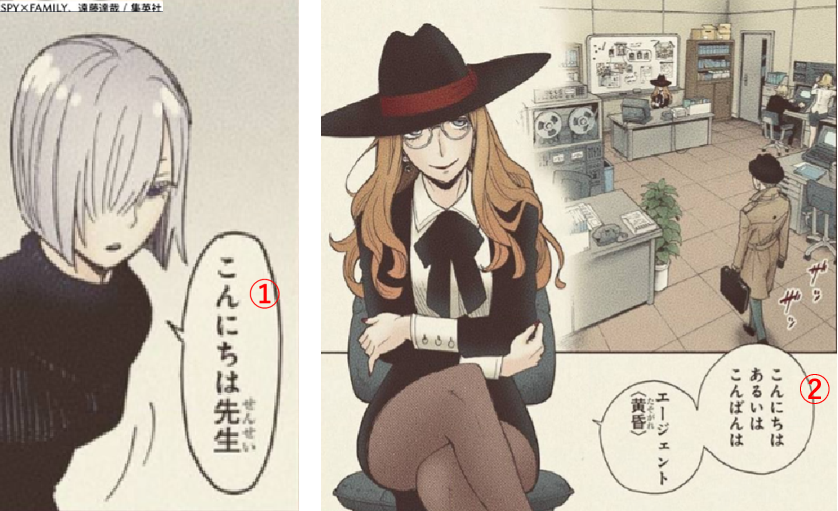
<Explanation>
①フィオナ「こんにちは 先生」
Fiona “Hello teacher”
② シルヴィア 「こんにちは あるいは こんばんは エージェント<黄昏>」
Sylvia “Good day, or rather, good evening, agent “Twilight”.”
「こんにちは 」is a daytime greeting.
「こんばんは」is a greeting from evening to night when the sky is dark.
In “SPYxFAMILY”, the Westelis’s intelligence Agency seems to use「こんにちは あるいは こんばんは 」as a password to identify the other party as a companion. Japanese people usually don’t use such expressions in natural conversation. But for a spy to use it, you don’t know when you’re greeting, and it’s mysterious, so it’s perfect!
As an aside, this “Good day, or rather, good evening” is a tribute to “Good Morning Mr.Phelps…” in the mission transfer tape of the American TV drama “Mission Impossible”…
Greetings before going to bed
Plain:おやすみ
Polite:おやすみ なさい
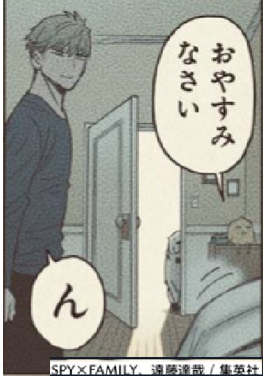
<Explanation>
アーニャ「おやすみ なさい」
These are greetings usually used just before going to bed at night. These are sometimes used as greeting when parting with someone late at night.
It is said that this word is based on the words that the inn keeper used to say to his/her guests,「ゆっくり おやすみ ください -“Please take a good rest.” 」It is a word that assumes that you will go to bed immediately after this and rest, so it is mainly used “just before going to bed.”
Word of affirmation
Polite:はい
Word of negation
Polite:いえ/いいえ
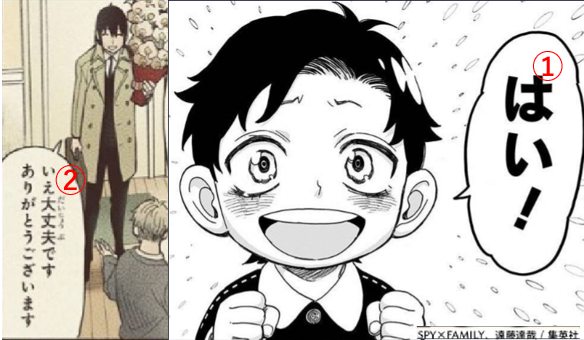
<Explanation>
①ダミアン 「はい!」
Damian “Yes!”
Yuri “Oh no thank you. I’m fine.”
These words are equivalent to “Yes” and “No” in English.
In ②, Yuri uses 「いえ」 in front of 「ありがとうございます」 (to be precise, he also adds “I’m fine” in between, but this “I’m fine” has the same meaning when it comes after “Thank you”.). This 「いえ ありがとうございます」 is used as “No thank you”
In plain style of speech , the sounds and forms of affirmation and negation are similar.
Affirmation「うん」/ Negation「ううん」
Perhaps because of the similarity in form, Japanese natives often put supplement words afterwards, so let’s study this expression again later.
This time, please remember polite form,「はい」 and「いえ」。
Words, expressions and daily habits reveal a country’s culture.
⇒Let’s dig a little deeper in the second half of “Greetings and Useful Expressions”, #7!
Description of the structure and cautions
This article is divided into several sections. An orange heading line marks the beginning of each section. you can memorize heading words and expressions as they are. After that, there is <Explanation>, and first, I will show the frames that use the words and expressions introduced in Japanese version of “SPYxFAMILY”, so please enjoy and check how to use them. A detailed explanation follows.
Headings do not include literal translations of the Japanese words on the topic. But under each Japanese line of <Explanation>, there is an English translation from the English version of the Manga “SPYxFAMILY” for reference, which is quite free. This is because Japanese often contains nuances that cannot be directly translated in other languages. So, in <Explanation>, I will explain the nuances unique to Japanese in this article. Please feel the real Japanese, not a direct translation from English.
※In the articles on this blog, the furigana (ruby) of Japanese nouns that come from foreign language proper names are written in the foreign language. The furigana (ruby) of the nouns, which come from common foreign language nouns, are written in Romaji with Japanese pronunciation.
※ In terms of grammar, casual expressions are called “plain style of speech” and polite expressions “polite style of speech”. However, the headlines of this blog post simply refer to them as “casual” and “polite” respectively.
Click here to return to the top.
Words (only those not explained in the article)
- noun:N
- verb:V
- adjective : Adj
- i-adjective : i-adj.
- na-adjective:na-adj.
- adverb :Adv
- 夫 N- husbund
- など Focus particle (a particle which add specific meaning)-something trivial
- 寮 N- dormitory
- 先生 N- teacher
- あるいは Conjunction- or
- エージェント N- agent
- 黄昏 N- twilight
- ゆっくり Adv-at ease/slowly
- ゆっくり休む rest at ease
- 大丈夫です (⇒See #7 article)
